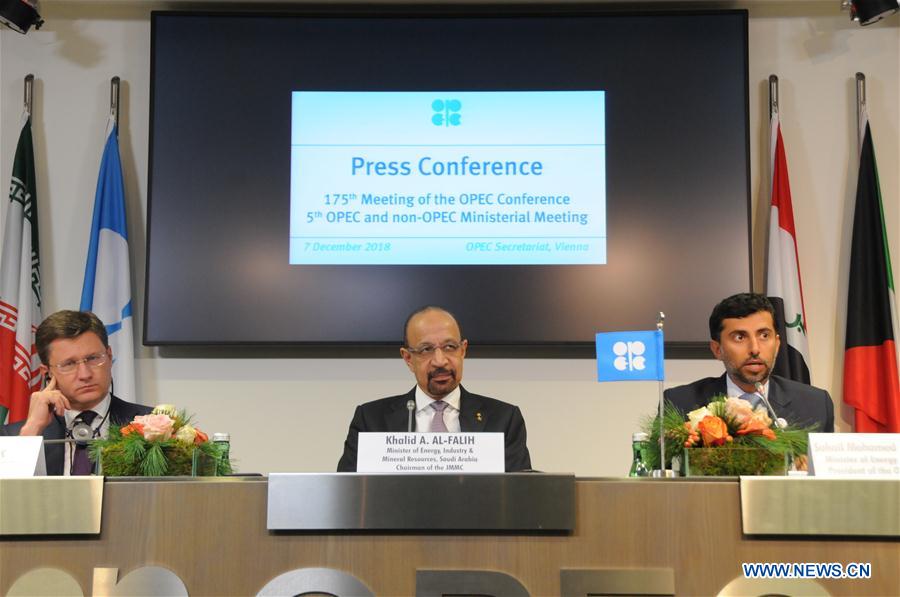OPEC and allies agree to cut crude output by 1.2 mln barrels per day

(From L to R) Russian Energy Minister Alexander Novak, Saudi Energy Minister Khalid al-Falih, and UAE Minister of Energy and Industry Suhail Mohamed Faraj Al Mazrouei attend a press conference after an OPEC and non-OPEC oil producers meeting in Vienna, Austria, on Dec. 7, 2018. The Organization of the Petroleum Exporting Countries (OPEC) and Non-OPEC oil producers on Friday agreed to jointly cut the crude production by 1.2 million barrels per day, to be implemented in January 2019 for an initial period of six months. (Xinhua/Liu Xiang)
The Organization of the Petroleum Exporting Countries (OPEC) and Non-OPEC oil producers on Friday agreed to jointly cut the crude production by 1.2 million barrels per day (bdp), to be implemented in January 2019 for an initial period of six months.
According to the agreement reached, OPEC member states contribute 0.8 million bpd output cut and Non-OPEC oil pumpers including Russia contribute 0.4 million bpd output cut from the production of October level. But the details of the quota for each member state are not given.
The deal was reached after Iran was granted exemption from curbing its output due to U.S. sanctions.
The surge of U.S. oil production, which has increased by 2.5 million bpd since early 2016 to 11.7 million bpd, has given OPEC and other oil pumpers more pressure in global market competition.
The joint output cut decision made by OPEC and non-OPEC members came at a time when oil prices declined around 30 percent over the last two months due to over supply in the global crude market.
Russia is to cut production by 2 percent from October's output of 11.4 million bpd, Russian Energy Minister Alexander Novak told reporters, noting that Russia would reduce supply gradually due to climactic conditions.
The oil price rebounded after major oil pumpers made the decision in Vienna.
"The Conference discussed the increasing market volatility and the broad consensus on the prospects for 2019 that suggests higher supply growth than global requirements, taking into account prevailing uncertainties," said the OPEC press release.
OPEC has been in alliance with Russia and several other oil pumpers in January 2017, trying to balance the oil market.
The joint output reduction is seen as a deeper cut than expected, as the U.S. wants OPEC to keep a relatively lower oil price.


 +86-13460933678
+86-13460933678